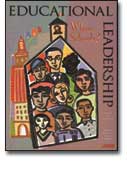What We Believe. . .
Every year at ASCD's Annual Conference, members of the Board of Directors meet with the Issues Committee to adopt resolutions and position statements on timely education issues. The following ASCD positions on Advertising in School and Vouchers relate to this month's theme issue, "Whose Schools?"
Advertising in Schools
Schools should be cautious in their use of any materials designed to promote commercial products or containing commercial advertising because students are required to attend school and are therefore a captive audience.
School should have guidelines for the use of materials provided by special-interest groups or by businesses that have a financial interest in advancing a particular point of view. Specifically, district policies should ensure that any commercial materials used in schools (1) are consistent with the district's values, goals, and objectives; (2) respond to a clearly defined educational need; (3) support the adopted curriculum; and (4) do not promote a brand name product. If educators use business-sponsored materials in the classroom, they should help students identify any biases the materials may contain. If students are too young to understand the bias, the materials should not be used.
With reasonable exceptions, such as newspapers and magazines, materials containing advertising should not be used for instruction except when the purpose is to analyze the advertising itself.
Vouchers
- It takes badly needed money away from public schools,
- It violates separation of church and state if religious schools are included,
- It increases inequity by encouraging the most active parents to leave the public schools, and
- It does not provide accountability of use of public funds.
(From What We Believe (1997), edited by Ron Brandt.)
Learning First Alliance Update
The Learning First Alliance held a Staff Seminar in September 1998 to identify Alliance goals and to help staff integrate these goals and activities into each organization's work. Cochaired by Anne Bryant and Tony Rollins, the seminar took place at the National Education Association headquarters in Washington, D.C.
In January 1998, the Learning First Alliance held its first Summit on Reading and Mathematics. Delegates from ASCD and 11 other national education organizations attended the meeting in Washington, D.C., to discuss action strategies to improve achievement in reading and mathematics. The results are two action papers: "Every Child Reading: An Action Plan" and "An Action Plan for Changing School Mathematics."
The Learning First Alliance is a newly created coalition whose 12 member organizations are working together strategically to improve student learning in United States schools.
ASCD Resources on "Whose Schools?"
The following is a partial list of ASCD resources on this topic. For a more complete listing, visit ASCD's Web site or call the ASCD Service Center.
- Taking Religion Seriously Across the Curriculum (1998). Nord, W. A. & Haynes, C. C. Price: $15.95 (member); $18.95 (non-member). Stock no. 198190.
- The Power of Paideia Schools: Defining Lives Through Learning (1998). Roberts, T. & the Staff of the National Paideia Center. Price: $11.95 (member); $14.95 (non-member). Stock no. 198034.
- Forging Unified Commitment From Diverse Perspectives: New Approaches to Helping Groups Through Change with Suzanne Bailey. Price: $39.95 (member); $47.95 (non-member). Stock no. 296279.
- Involving Parents in Education. Price: $290 (member); $340 (non-member). Stock no. 614235N62.
Brief Takes
ASCD has launched six new Topic Packs: Reading; Early Childhood Education; Looping/ Multi-age; Mathematics; Classroom Management; and Multiple Intelligences. To order, please call the ASCD Service Center.
On September 17, ASCD hosted an Open House in its new building. A panel discussion, moderated by John Merrow, featured Michael Fullan, Kris Gutierrez, John Goodlad, Asa Hilliard, E. D. Hirsch and Nel Noddings. Look for a full report in the November issue of Education Update.
ASCD has instituted a formal internship program at its headquarters in Alexandria. This year, we plan to welcome local high school and college students and a member of ASCD's student chapter program to work in various work units, including marketing and the ASCD library.
New ASCD Infobrief Examines Class Size Reduction. The latest issue of ASCD Infobrief, "Reducing Class Size: When Politics Meet Practice," takes a close look at what researchers, policymakers, and educators say about one of the most popular policy proposals in public education. To order this eight-page policy brief, or to subscribe to ASCD Infobrief, contact the ASCD Service Center at 800-933-2723; request stock no. 198222.
For Your Calendar
- 1999: San Francisco, March 6–8
- 2000: New Orleans, March 25–27
- 2001: Boston, March 17–19
- Using Constructivism to Promote Learning for All Students. Phoenix, Arizona: December 10–11, 1998
- Collaborative Assessment and Evaluation for the Elementary School. Phoenix, Arizona: December 10–11, 1998
- Designing Standards-Based Districts, Schools, and Classrooms Phoenix, Arizona: December 10–11, 1998
- Educational Leadership Academy Alexandria, Virginia: December 9–13, 1998, and August 2–6, 1999
